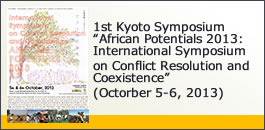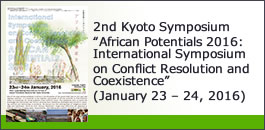[5th Public Lecture / 19th Plenary Committee Meeting] “Considering Violence in Africa: From Massive Conflict to Terrorism” (January 24, 2015)
Date: January 24, 2015
Venue: Inamori Foundation Memorial Bldg. (Inamori Center), Large-sized Room
There were massive conflicts during the period of 1990s to 2000s, but we can recognize the emergence of terrorism in contemporary Africa. The militant groups are small unit and they have aggressive actions cross the national borders. We invited famous researcher, a former journalist for this public workshop and provided opportunity to rethink violence in contemporary Africa.
Program
15:00-15:10
Opening remarks
Ohta, I (Kyoto University)
15:10-16:30
Considering Violence in Africa: From Massive Conflict to Terrorism
Keiichi Shirato (Mitsui Global Strategic Studies Institute)
16:30-17:00
General Discussion
[4th Public Lecture / 15th Plenary Committee Meeting] “Reality of Conflict in Contemporary Africa” (March 29, 2014)
Date: March 29, 2014
Venue: Inamori Foundation Memorial Bldg. (Inamori Center), Large-sized Room
“Reality of Conflict in Contemporary Africa”
Recently, we face the problems on the path ways of conflict resolution, peace building, and the post conflict society rehabilitation in contemporary Africa. In this public workshop, we invited two famous scholar and journalist, Prof. Endo, M from University of Tokyo and Takao, T. from Mainichi Shimbun, major newspaper agency in Japan. We provided opportunities to discuss the ways for solving these problems.
Program
15:00-15:30
“To consider the contemporary condition of African conflicts”
Mitsugi Endo (University of Tokyo)
15:30-16:30
“The importance of people’s bonds and sequential thinking in the scene of African conflicts”
Tomonari Takao (Mainichi Shimbun)
16:30-17:00
General Discussion
[3rd Public Lecture / 10th Plenary Committee Meeting] “Peace Building in Africa: Challenges Found in the Field and the Future Options” (March 23, 2013)
Date: March 23, 2013
Venue: Inamori Foundation Memorial Bldg. (Inamori Center), Large Conference Room, Kyoto University
Program
14:00-14:15 Mitsugi Endo (Tokyo University)
Aims of the Workshop
14:15-15:15 Rumiko Seya (Japan Center for Conflict Prevention)
Peace Building in Africa: Challenges Found in the Field and the Future Options
15:15-16:00 Question and Discussion
16:30-17:30 Meeting for Exchanging Ideas between Ms, Seya and Project Members
Abstract
Many areas of contemporary Africa faces difficult questions, such as how various dispute is made to end and how dismantled and exhausted society by dispute shall be rebuilt. Rumiko Seya, who had participated in conflict resolution and peace building in Africa, talked about the problem with her experiences and the concrete example.
[2nd Public Lecture / 9th Plenary Committee Meeting] “Utilizing African Potentials for Conflict Resolution” (January 26, 2013)
Date: January 26, 2013
Venue: Inamori Foundation Memorial Bldg. (Inamori Center), Large Conference Room, Kyoto University
Program
15:00~15:15 Itaru Ohta (Kyoto University)
Aims of the Workshop
15:15~16:15 Jin Matsumoto (Journalist, Adviser to Asahi Simbun)
Does Africa Have Conflict Resolving Ability?
16:15~16:35 Break
16:35~17:35 Yntiso D. Gebre (Addis Ababa University)
Legal Pluralism and Customary Courts in Ethiopia
17:35~18:00 General Discussion
Abstract
Itaru Ohta (Kyoto University)
The Aims of the Workshop
Contemporary African Societies face the task of how to prevent conflict and violence, how to reconstruct and rejuvenate the social order destroyed and exhausted by conflicts and how citizens can reconcile after the conflict. In this conference, we discuss how the knowledge or institution, which people in Africa created, accumulated, and practiced, can be applied to those pragmatic issues.
Jin Matsumoto (Journalist, Adviser to Asahi Simbun)
Does Africa Have Conflict Resolving Ability?
□ The answer is “Yes, she does.”
□ E.g. Somaliland (population of 2.8million)
- The civil war broke out in the middle of 1980s. Barre regime collapsed in 1991.
- Armed conflicts with in Somaliland continued. There were about 20 clans and 50 thousands AK-47 .
- Clan leaders in Borama called a peace conference.
- 82 elders called out to give up guns. Militias were absorbed into police and army.
- UNDP took charge of disarmament.
- Almost all guns held by citizens were withdrawn by year 2002.
- Markets full of female. Reliable public peace.
- Though, Somaliland is “mono-ethnic country”: citizens shares common interests.
□ Multiethnic countries are put in much serious situations: Republic Democratic of Cong, Northern Uganda, Chad, Zimbabwe
- Economic collapse – food shortage – dependence on one’s own ethnicity – ethnic conflicts prevail.
- Patrons receive bribe to support clients – to the clash of national economy.
□ Is it possible to resolve conflict in multiethnic society? – “Yes, if they find other values other than depending on ethnicity”
- No prominent ethnic conflicts in the era of independence wars in Africa.
- A society that people can live without depending on ethnicity. A society that people can live by working hard will replace ethnicity-prevailing societies.
□ Do not expect governments because they are always “benefit inducing”
- Needs of incentive based on “when you work you can eat,” “when you work hard, there are more fortune.”
- Much incentive in ORAP in Zimbabwe.
- South Africa’s investment in Mozambique and Tanzania. Improvement in employment rates and labor quality.
- My experiment. Introducing economic rationality by private bodies. OSR.
□ Difficult but worth trying.
Yntiso D. Gebre (Addis Ababa University)
Legal Pluralism and Customary Courts in Ethiopia
In Ethiopia, plural legal systems exist: the formal (regular) court and the informal (customary) court. With the exception of family matters that may be handled outside of the regular court and disputes between Muslims that may be taken to the Sharia court, conflicts resolved through other traditional mechanisms lack legal recognition. However, research reveals that most people in rural communities and many people in urban areas prefer the customary courts over the formal law for all forms of disputes.
In the past, the customary dispute resolutions mechanisms were considered backward practices that need to be replaced by the modern codified law. Today, there exists a growing recognition of the relevance of traditional conflict resolutions. In recent years, it became evident that sometimes government authorities encourage customary courts to address conflicts that could not be resolved through the state machinery.
Customary dispute resolution institutions are not without blemishes, however. Some are criticized for violating human rights and for excluding women and the youth from participation in hearings. This places traditional courts at odds with the international instruments that Ethiopia has signed. There are also instances, in some localities, where customary courts handle hard crimes such as homicide and even pass death sentences at the village court level. This is another source of confrontation between the formal and informal systems.
In this presentation, I will explain the reasons why the traditional courts remain relevant and in some cases even dominant; the manifestations of the recent seemingly favorable trend and its implications; and the challenges associated with the use of customary courts.
[1st Public Lecture / 1st Plenary Committee] “Conflict Resolution and Coexistence in Africa”(July 2, 2011)
Date: July 2, 2011
Venue: Inamori Foundation Memorial Hall (Inamori Center), Kyoto University
Contents
The greatest obstacles facing modern African society are the impoverishment and disintegration of the social order caused by conflict. In particular, since the 1990s, large-scale civil wars and regional strife have erupted regularly, and multifarious conflicts have been occurring, such as violent clashes over land ownership and use, as well as territorial disputes over political resources. The international society has been seeking a solution to this state of affairs according to the normative values and concepts that originated in the U.S. and Europe, such as liberal democracy.
In response to these issues, our workshop takes an entirely different stance, namely, that the knowledge and institutions created, developed, and employed by African people can also serve to achieve conflict resolution and a state of coexistence. However, such knowledge and institutions are not fixed and unchanging entities within Africa. Rather, they have grown out of Africa’s repeated interaction, both consonant and dissonant, with the outside world. This workshop will strive to consider avenues for leveraging Africa’s knowledge and institutions in order to resolve current disputes and recover a cohesive social structure.
Keywords
Peace-building, Nation-building, Post-conflict, Rwanda, South Sudan
Program
3:30-13:45 Itaru Ohta (Kyoto Unversity)
Introduction
13:45-14:45 Eisei Kurimoto (Osaka University)
Unrestored Peace at the Community Level: Challenges and Limits of Peace-Building in “Post-War” Southern Sudan
14:45-15:00 Break
15:00-16:00 Shinichi Takeuchi (JICA Research Institute)
Rwanda’s Gacaca under Post-Genocide State-Building
Report Overview
Itaru Ohta (Kyoto Unversity)
Introduction
This workshop is a 5-year research project, officially titled “A Comprehensive Regional Study on Conflict Resolution and Coexistence through Leveraging Africa’s Potentials,” which started in academic year 2011 (also the foundational year of the JSPS’s Grants-in-Aid for Scientific Research [S]). Ohta, the representative of the project, explained outline of the project. Modern African society is confronting the formidable obstacles of impoverishment and disintegration of the social order caused by conflict. Ohta argued that in the face of these real-life challenges, instead of importing Western systems and values to the African continent, this project seeks to clarify new avenues for effectively utilizing the knowledge and institutions created, accumulated, and employed by African people (“African Potentials”) such that they can be used to contribute to conflict resolution and social order construction (co-existence). (Reporter: Itaru Ohta)
Eisei Kurimoto (Osaka University)
Unrestored Peace at the Community Level: Challenges and Limits of Peace-Building in “Post-War” Southern Sudan
The second speaker, Kurimoto, talked about the peace-building in “post-war” southern Sudan. Ever since the signing of the 2005 Sudanese Comprehensive Peace Agreement, the government forces and the Sudan People’s Liberation Army (SPLA) have been maintaining peace in southern Sudan (which is scheduled to become independent in July 2011). However, peace at the community level has not been accomplished, and armed conflicts are erupting not only between different communities but also within communities. Although peace discussions are held in certain areas to promote reconciliation at the community level, the results have not been substantive. Furthermore, other regional areas exist where no such initiative has been taken at all. In order to rebuild the society, it is essential to follow “peace from below” approaches that focus on endogenous, community-level peace initiatives, and also organically join these movements with “peace from above” that is implemented by government agencies.
During the question-and-answer session, discussion was generated from questions that included, “What specifically needs to be done to support ‘peace from below’ activities?”; “Who will conjoin the ‘peace from below’ and ‘peace from above’ movements, and how will they do that?”; and “Isn’t it necessary to stimulate business activity on a more individual level rather than just holding peace conferences?” (Reporter: Toru Sagawa)
Shinichi Takeuchi (JICA Research Institute)
Rwanda’s Gacaca under Post-Genocide State-Building
The third speaker, Takeuchi, talked about Rwanda’s post-conflict state-building. On the basis of the World Bank’s governance indexes of “political stability” and “voice and accountability,” three types of post-conflict state-building were distinguished: (1) where both indexes were stagnant (e.g., Afghanistan, Sudan), (2) where the “political stability” index considerably exceeded the “voice and accountability” index (e.g., Rwanda, Angola), and (3) where both indexes showed parallel improvement (e.g., Sierra Leone, Burundi). Regarding the post-conflict state-building, the international community has emphasized the necessity of enhancing not only the state capacity of providing basic social services including security, but also state legitimacy vis-à-vis the society. Among the above-mentioned three types, the first two clearly indicate a gap between the goals promoted by the international community and actual status of state-building. While the type (1) shows the lack of state capacity for the provision of security, the type (2) demonstrates a risk of the authoritarian state-building, which may damage the state legitimacy. In fact, a propensity toward authoritarianism among countries that have experienced serious internal conflict has been so far observed. Examining the experiences of post-conflict state-building in Rwanda, Takeuchi indicated its achievements and challenges. On the one hand, the country has succeeded in maintaining social order under the rule of the Rwandan Patriotic Front, the former rebel led by ethnic minority. On the other hand, the priority of political stability may have hampered the enhancement of liberal democratic governance. Inclusiveness in the governance as well as economic development should be consciously taken into account in its state-building process
During the question-and-answer session, debate centered on the differences in the post-conflict societies in Rwanda and Burundi, the manner in which the conflicts ended, and the great relevance of the degree of involvement of the international society. (Reporter: Shuichi Oyama)
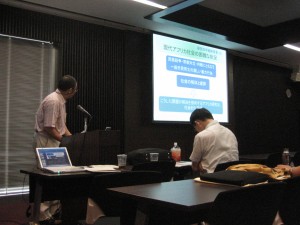
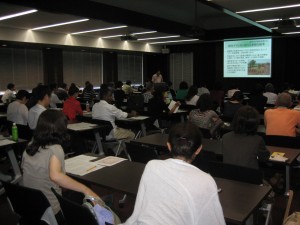
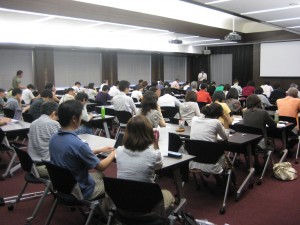
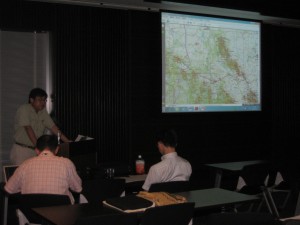
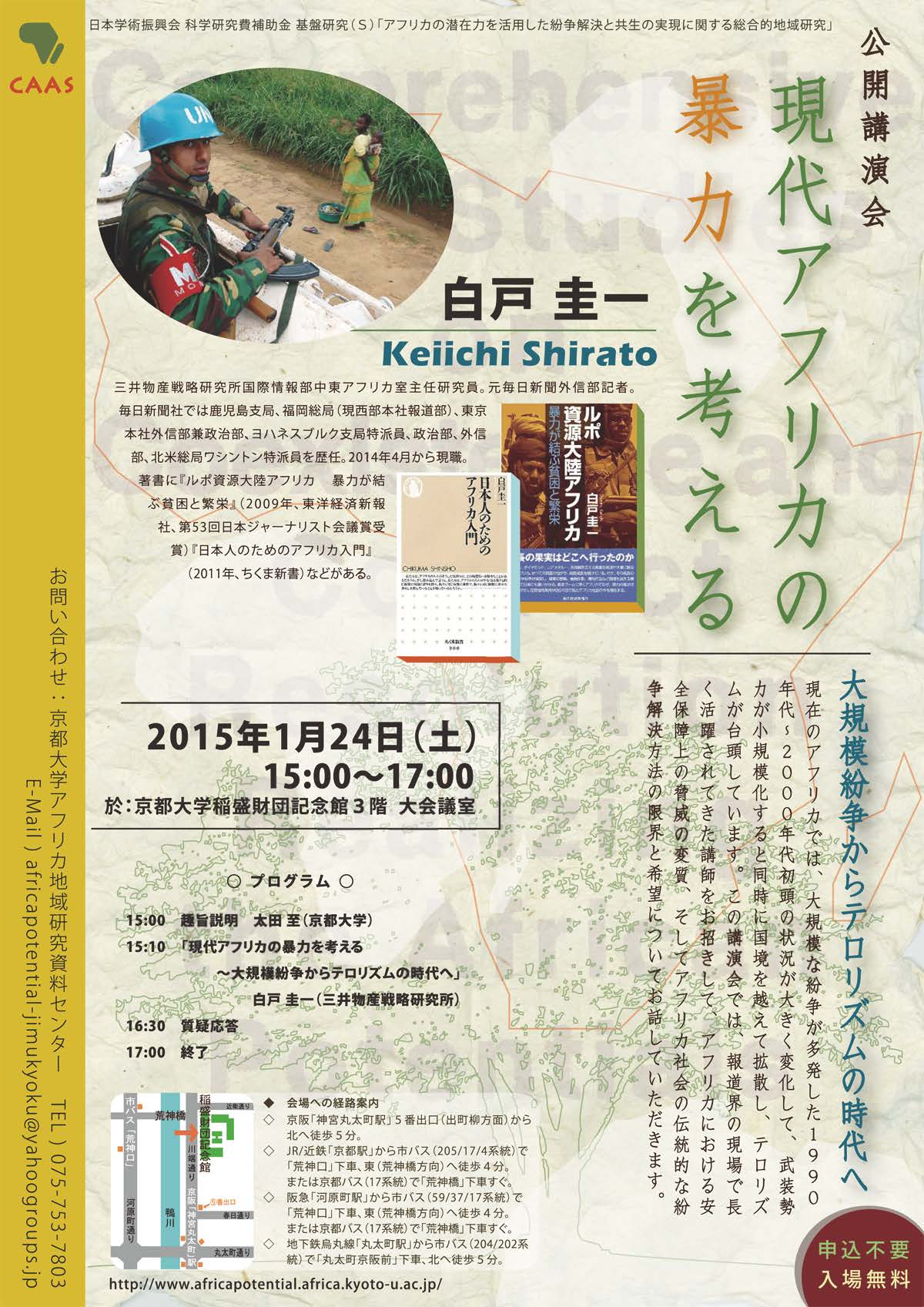
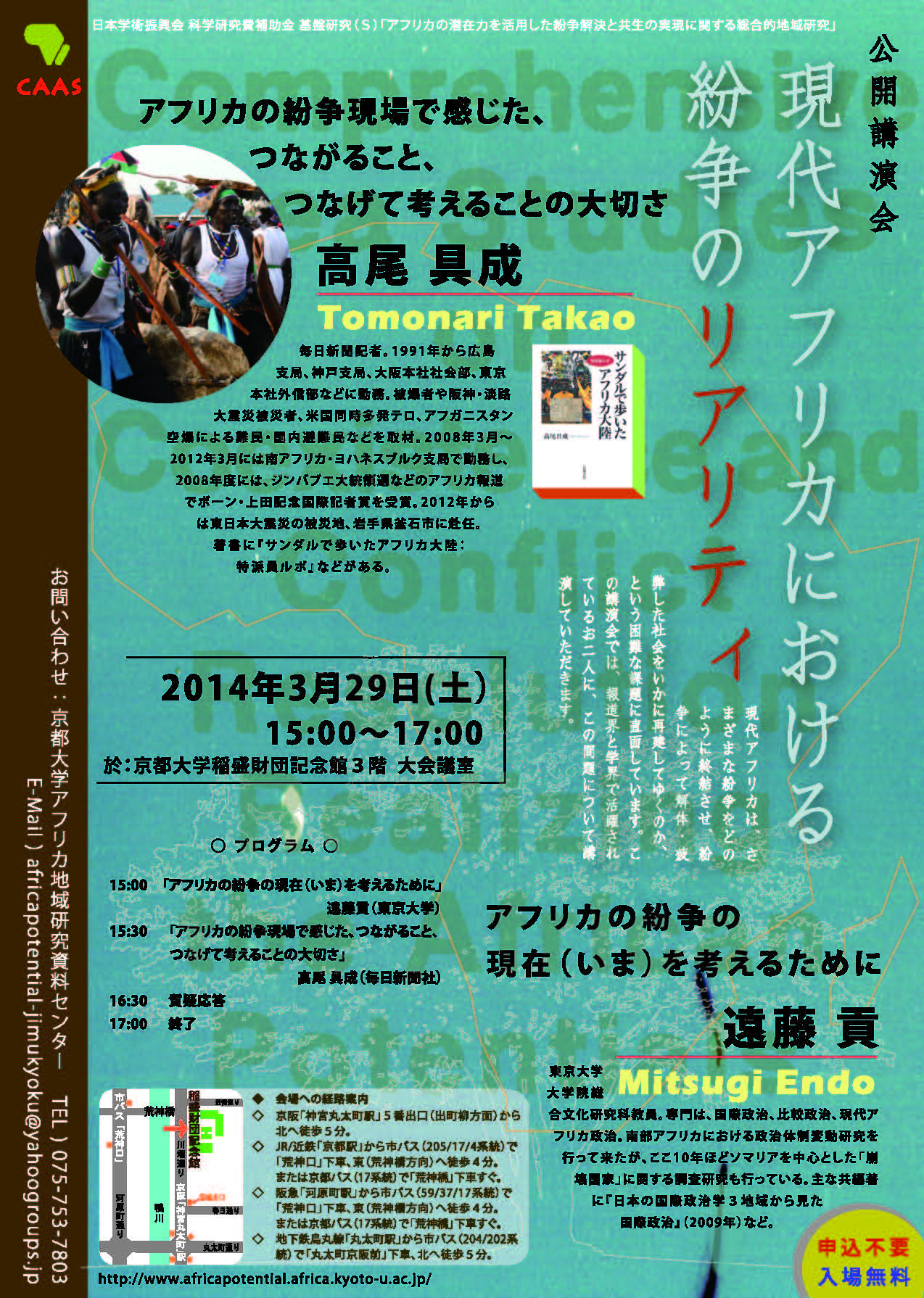
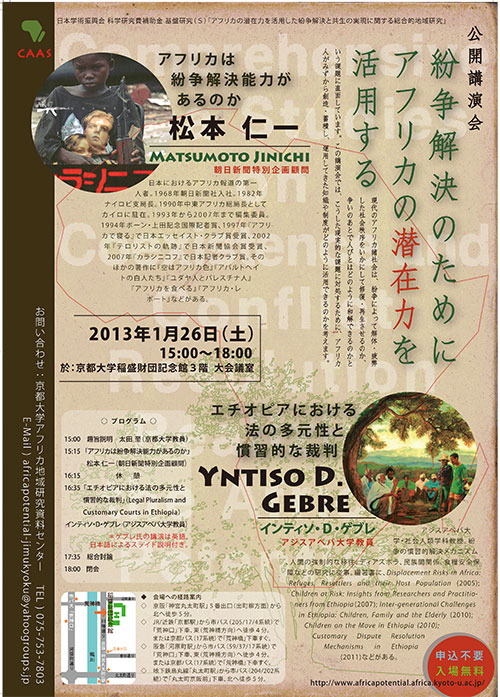
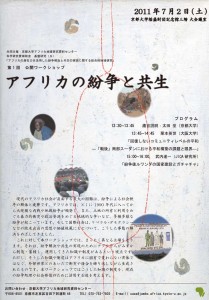

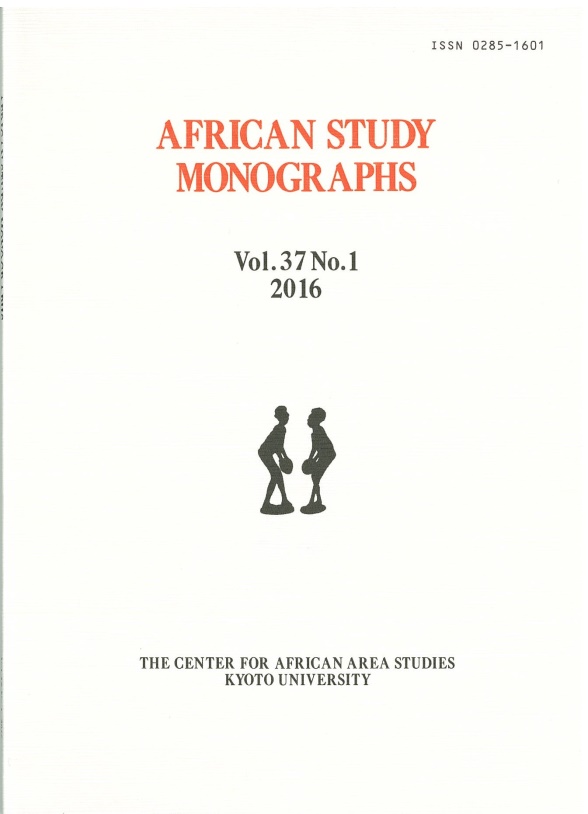
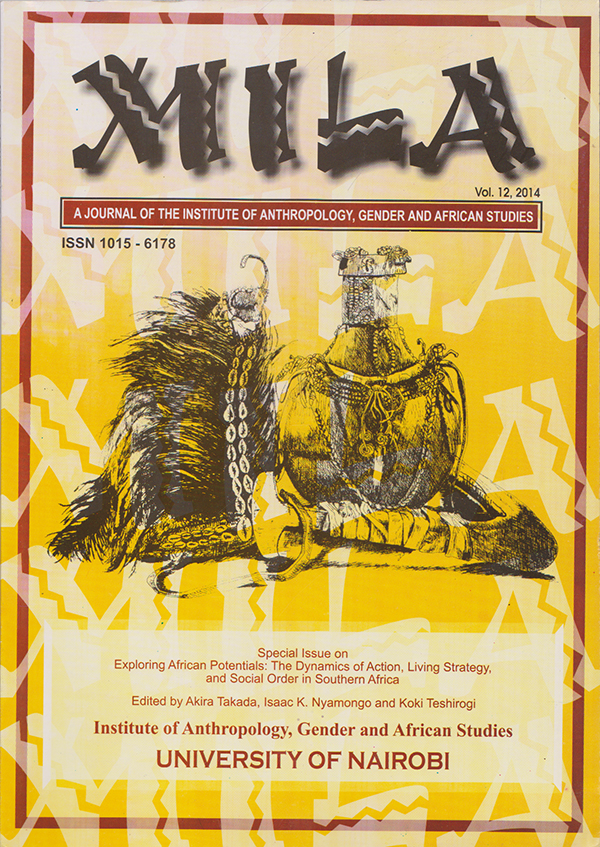 Exploring African Potentials, Mila Special Issue
Exploring African Potentials, Mila Special Issue